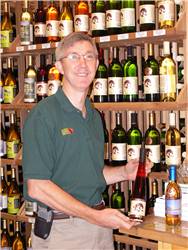 When he’s not busy as co-CEO of Bishops’ Orchards, or as vice-chairman of the Board of Education, Keith Bishop is likely finding time to turn apples (and peaches, pears, strawberries, and raspberries) into wine.
When he’s not busy as co-CEO of Bishops’ Orchards, or as vice-chairman of the Board of Education, Keith Bishop is likely finding time to turn apples (and peaches, pears, strawberries, and raspberries) into wine.
Now, he’s about to unveil the second annual Shoreline Wine Festival, Aug. 16 and 17. Keith devised the event as celebration of the best vintages coming out of Connecticut’s small wineries. The festival features more than 50 wines from 13 wineries, served up with free seminars and live entertainment, on Bishop’s Farm Market and Orchards property.
Since 2005, Keith’s been responsible for Bishop’s growing reputation as a Connecticut Farm Winery. After “noodling the idea for a few years,” the time became ripe to add wine to the product line, he says. The company’s decision to build a market addition and expand into fully prepared meals and foods dovetailed neatly with the idea of offering wines.
With a successful cider mill already on the premises and an ample supply of fruit, Keith knew many of the components were already in place to increase the winery’s chances of success.
“We sold apple cider and pear cider to three other Connecticut wineries to make wine and that sparked my interest. In talking with them, I got excited about it,” he said, adding that a change in Connecticut wine laws supplied the final push into the wine world.
The law allowed licensed Connecticut farm wineries to sell each other’s products, creating “…the synergy of us being able to focus on making wine from our crops, as well as promote other great Connecticut wineries,” says Keith.
To learn the art of fruit wine making, Keith hired a consultant, picked the brains of others in the business, and got in touch with a fellow Cornell graduate with a winemaking background. He tackled the tangle of federal and state requirements to become licensed then began experimenting with fermenting cider into wine.
In short order, Keith produced four fantastic blends: Stone House White, Faulkner’s Spiced Apple, Apple Raspberry Blush and Honey Peach Melba. The first bottles were produced and labeled with a unique apple tree silhouette, trimmed by local paper-cutting artist Martha Link-Walsh.
Situated in the market’s “wine corner,” together with such impressive vintages as those produced by Clinton’s Chamard Vineyards, Keith began offering Bishop’s wines for tasting and still does today, with a list of 11 wines and growing.
“Most people are pleasantly surprised and even astounded at how good the wines are,” Keith says.
Experts agree. In 2006, “Happily ImPeared,” an apple and pear blend, won a Bronze Medal at the Big E, as did Honey Peach Melba. In 2007, Bishop’s Stone House White took a Big E Bronze Medal. Also in 2007, Honey Peach Melba won a Silver Medal Winner at Amenti del Vino International while Bishop’s special off-dry apple wine, “Celebration” took Bronze; as did Bishop’s Apple Raspberry Blush and “Adams Apple,” and ice-style dessert wine.
“Ice-style wines are made from fruit frozen on the trees,” explains Keith. “You harvest the fruit at below freezing, and the water that’s frozen is also retained. It makes for a more intense level of sugar and flavor.”
A fifth-generation Bishop’s family member, Keith manages all aspects of each wine created for the Bishop’s label, from fermenting the cider to drawing off successive batches to improve clarity, to blending in fruits, determining proper chemical balances, and controlling yeast, sugar, and alcohol levels.
“It’s my baby, because I’m the one who decided to go ahead and do it!” he says, laughing.
Tackling challenges isn’t something Keith seems to shy away from. First elected to the Board of Education in 1991, he says he hopes to stay involved for some time to come.
“I want to see the school [facility needs] projects through. It’s a matter of what the community needs to have and what it can afford to have.” He’s on the Connecticut Wine Trail Association and has been actively involved in seeking legislation on the industry’s behalf.
As for the future, Bishop’s will continue to find ways to blend its produce into new products, says Keith. This fall, he’ll introduce another new product: hard cider. “It’s going to have a lightly sparkling effervescence; dry and medium-sweet,” he explains.
Keith’s also just about to bottle a brand new strawberry-raspberry wine blend, christened Crimson Rose. He plans to experiment with a blueberry wine blend next.
Experimenting with new ideas is also how Keith devised the Shoreline Wine Festival. “It’s my brainchild, because I saw a need to do more to expose Connecticut’s wine industry,” he says.
Keith says promoting other wineries, together with his own, is one of the best ways to help Connecticut wineries succeed.
“Most people have Connecticut pretty low on their wine list. The more wineries there are in Connecticut, the more it will become recognized in general as an industry.”
Article by: Pam Johnson
